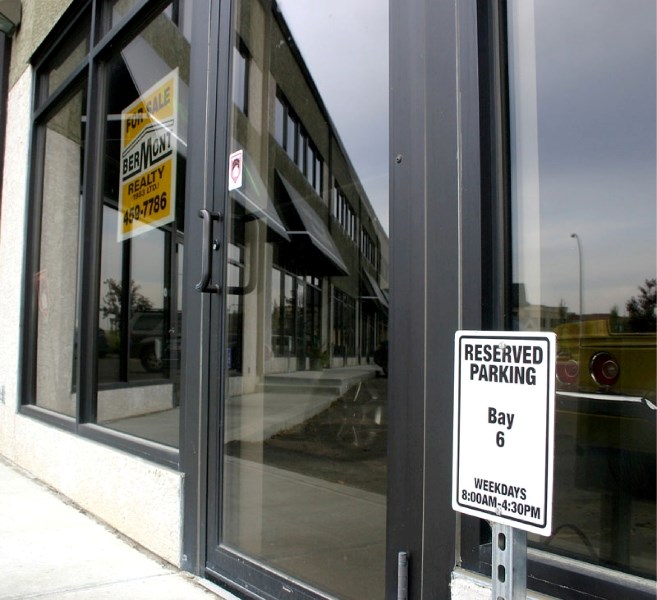Business owners at 20 Circle Dr. are scratching their heads about the way the city allots parking stalls.
The building is a business condominium complex built on spec with the minimum number of stalls allowed for its size under the city’s bylaws, owners say.
The city’s process has left those owners who bought the last units without parking stalls. This means they can’t get a development permit or sell their units, because any new owner would also be left without parking.
“Who wants to buy [a business] without any parking?” said Carol Olivieri of Blue Kettle Specialty Foods.
The city calculates the number of parking stalls required by looking at the developed square footage and the number of employees. If a new business is seeking a development permit and the building has enough unassigned spaces to meet the number defined by the guidelines, the permits are approved. But that system means those businesses that buy first can get more than their share of parking spaces, leaving later developments without any, rendering the units useless except for storage, Olivieri said.
The city’s planning department has no idea what types of businesses will populate spec buildings, said Guy Boston, general manager of planning and engineering. So, aside from assessing the individual permit applications that come up as businesses move in, there’s little the department can do.
“This is really something that needs to be managed by the condo association,” he said. “We try to work with the owner until the parking is assigned and then it’s up to the owners.”
Olivieri and other business owners said the situation has them feeling trapped. They can’t move and they can’t expand within the building because that would require more parking spaces.
Olivieri isn’t buying the city’s explanation.
“It seems that they sort of stick their head in the sand,” she said. “They let the building get way too big for the amount of parking.”
She also assigns partial blame to the developer, who she said marketed the units as great for mezzanines (upper floors of offices), which have eaten up parking spaces.
“I think they sold everybody a bill of goods,” she said.
Realtor Phil Filipchuk, one of the partners in the development, said the developers were above board in their marketing.
“It was sold the way it was, approved by the city,” he said. “We were just selling the basic units.”
Business owners have met with Couns. Roger Lemieux and Cathy Heron. Lemieux agrees with Boston that it’s up to the condo association to deal with its parking woes.
“These guys are building mezzanines,” Lemieux said. “I really can’t understand why there’s any argument here.”
The condo association has dealt with the problem internally by assigning three stalls per bay, plus extras for handicapped parking. Those businesses with more employees have them parking on the street.
However, this internal solution doesn’t affect how the city’s planning department approves development permits, so it doesn’t help the marketability of the units, owners say.
Heron thinks this is a major problem.
“I think it’s very, very unfair the way the city has allocated parking,” she said. “We met with administration and they said there’s nothing we can do. That’s not a good enough answer.”
She intends to bring forward a motion after council has finished the budget process in late December.
Future buildings should split the parking equally among the bays, with a pool of extra stalls available for those businesses with greater needs, she said.
“You shake your head sometimes that these things can even occur. We’re trying to be business friendly,” she said.
A simple solution to the current problem would be for the city’s planning department to recognize the allotment of three stalls per unit rather than applying its existing formula when approving permits, said Glenn Veenendaal, owner of Blackstone Mechanical. Going forward, a bylaw change is clearly needed, he said.
“It’s an asinine system,” he said.




